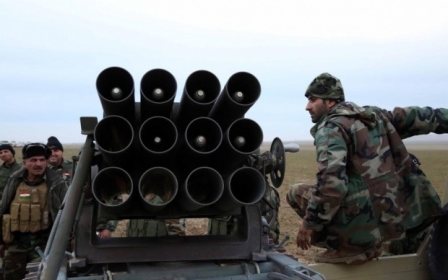Amnesty condemns Turkey for 'reckless' force in Kurdish areas

Turkish security forces have subjected residents of Kurdish-dominated southeastern Turkey to "collective punishment" with military operations backed by curfews, Amnesty International said on Thursday, accusing the army of "recklessly" using excessive force.
Turkey has imposed successive curfews over the past few months in towns in the southeast to back military operations aiming to crush fighters of the Kurdistan Workers Party (PKK).
Curfews remain in place in Cizre in Sirnak province and the Sur district of Diyarbakir city, which were imposed on 2 December and 14 December respectively. A curfew in place since 14 December in Silopi, also in Sirnak, was partially lifted on Tuesday.
The army said they have killed hundreds of fighters in an "anti-terror" operation but Kurdish groups have long raised alarm over the civilian toll.
"The operations currently being conducted under round-the-clock curfews are putting the lives of tens of thousands of people at risk and are beginning to resemble collective punishment," said John Dalhuisen, Amnesty International's Europe and Central Asia programme director.
Amnesty International called on the Turkish government to end the indefinite curfews, and said residents had been left without access to emergency healthcare, food, water and electricity for extended periods.
"Operations by police and the military in these areas have been characterised by abusive use of force, including firing heavy weaponry in residential neighbourhoods," the group said in a report.
"There is little doubt that the Turkish authorities are putting lives at risk by using lethal force excessively and recklessly," it added.
The military has aimed its operations at the PKK's youth branch, the Patriotic Revolutionist Youth Movement (YDG-H), claiming they have dug trenches and erected barricades in urban areas.
"Security measures, including those aimed at arresting suspected members of YDG-H, must adhere to Turkey’s obligations under international human rights law," said Amnesty.
Amnesty used data from the Human Rights Foundation of Turkey (TIHV), which has said that 162 civilians have been killed during the curfews since operations were launched in August 2015, including 29 women, 32 children and 24 people over 60.
With Turkey part of the US-led coalition against militants in Syria and a key player in the EU refugee crisis, Dalhuisen said the Turkish authorities had faced "very little" criticism from the international community.
"Strategic considerations ... must not overshadow allegations of gross human rights violations. The international community must not look the other way," he said.
Amnesty’s condemnation follows the arrest of 21 academics for "terrorist propaganda" last week over a petition denouncing military operations against Kurdish rebels in the southeast that was severely criticised by President Recep Tayyip Erdogan.
Police arrested the academics from the University of Kocaeli, near Istanbul, in an early morning raid on their homes, the official Anatolia news agency said.
New MEE newsletter: Jerusalem Dispatch
Sign up to get the latest insights and analysis on Israel-Palestine, alongside Turkey Unpacked and other MEE newsletters
Middle East Eye delivers independent and unrivalled coverage and analysis of the Middle East, North Africa and beyond. To learn more about republishing this content and the associated fees, please fill out this form. More about MEE can be found here.




